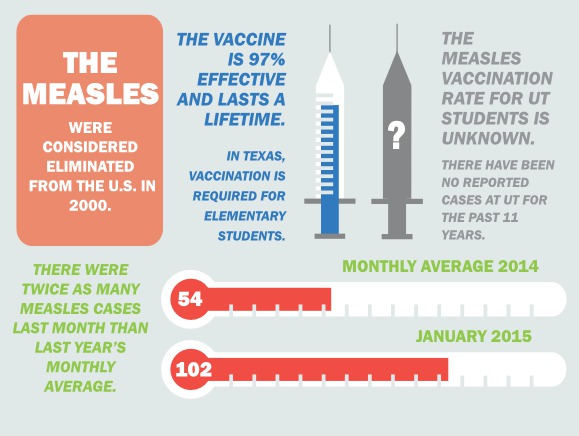Despite a national spike in measles cases, the University does not require that U.S.-born students be vaccinated against measles.
Documentation of a measles vaccine is required for international students.
In the first 30 days of the year, the Centers for Disease Control and Prevention reported 102 cases of measles in the United States. Ninety-two percent of those were traced back to one outbreak, stemming from a case at Disneyland in Anaheim, California. Over the course of the month, the disease spread through 14 states, including Texas.
Texas state law requires all children entering elementary schools to have two doses of the measles vaccine, according to the Texas Department of State Health Services. By college, all students from Texas should be vaccinated, making measles contraction less likely, said Charlotte Katzin, nurse manager of the Allergy Immunization Clinic.
“That documentation has already happened before students get to us,” Katzin said. “It’s not that we don’t think it’s important that people are immunized, it’s just having to make them show proof seems like a lot of work to have them prove something that’s already happened before they got here.”
Other countries, such as Italy, Vietnam and the Philippines, have lower vaccination rates, as well as more instances of measles. Because of the higher number of cases internationally, international students at UT are required to provide documentation of receiving two doses of a measles-containing vaccine, most commonly known as the measles, mumps and rubella vaccine.
“Historically, most cases of measles in the United States are what’s called imported cases, so it’s someone coming from another country, or they’ve traveled to another country, been exposed to the measles and they bring it back to the United States,” Katzin said.
The measles, mumps and rubella vaccine is 97 percent effective. Measles is considered highly contagious, infecting 90 percent of non-immunized people who come into contact with someone who has contracted measles.
David Vander Straten, medical director at University Health Services, said students who have not received the vaccine can do so at the Allergy
Immunization Clinic.
“The first step [is] that we would still want to encourage students to see if they’ve got their immunization record, either with family or friends, or some sort of documentation,” Vander Straten said. “That solves the question if they need [the vaccine] or not.”
The U.S. declared the elimination of measles in 2000, but numbers spiked in 2014, when there were 644 recorded cases. Although 95 percent of infants between 19 and 35 months old received at least one vaccine in 2013, according to the CDC, certain “pockets” of communities, including several in California, have lower rates of vaccination and are more susceptible to the disease.
This lower vaccination rate can often be attributed to religious, philosophical or scientific concerns, specifically with inaccurate reports that vaccines are linked to autism in children.
Caroline Starling, College of Natural Sciences representative, wrote a piece of legislation in support of Public Health Week at UT, which could include promotion
of vaccinations.
“I am in support of public health initiatives on campus,” Starling said.
Katzin said there have been no reported cases of measles at UT in her 11 years with UHS, but said all students should be cautious and get vaccinated.
“I would hope that people would be reminded of the importance of getting their kids vaccinated,” Katzin said. “It’s really been in the news, which I think is a
good thing.”





















